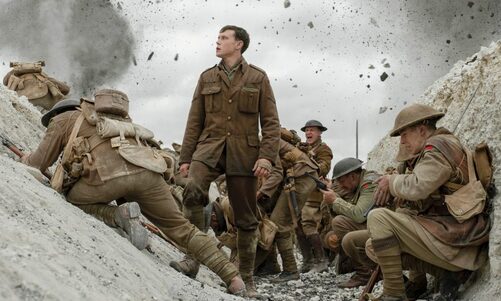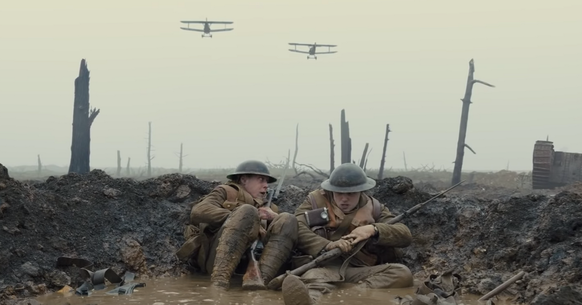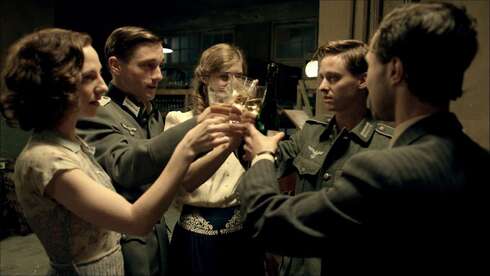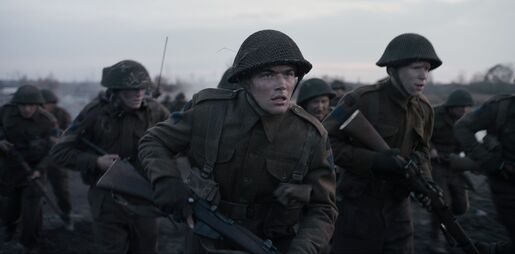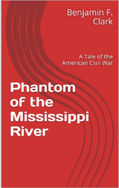|
By: Ben Clark To paraphrase historian Morris de Camp, what makes War Movies different from other historical drama movies is that so many war movies have a strong sense of “moral certainty”. The worst of these films are very one sided often dehumanizing the enemy, and are outright propaganda films. There is an unquestioning super patriot theme that dares to be challenged. The American military veteran is presented in a worshipful manner, especially veterans of World War II. In the late 1990s, there was a flurry of World War II veteran-worship led by the late historian, Stephen Ambrose. Ambrose’s history books portrayed the American WWII soldier as a sort of righteous demigod. You can see the influence of Ambrose books in the 1998 movie Saving Private Ryan and the 2001 HBO miniseries Band of Brothers. This veteran worship together with patriotic war drumming was very evident after the 9/11 terror attacks. The neoconservatives, or War Hawks, were quick to harness these pro-militaristic attitudes and adopted it into the “Party Line” – you are for us, or against us. In other words, take your pick; hero or traitor. As we all know and understand now, the clueless Bush neocons led America into strategic disaster in the Iraq occupation and endless war in Afghanistan. Don’t get me wrong – I am not a pacifist, but I believe that the shield of moral certainty is often misplaced and can obscure the most effective war aims and strategy which should/must be based on the most ironclad national interests, free of foggy sentiment and wishful thinking. It is interesting to note that there was a backlash post-1945 against the propagandistic, war-drum beating studio films made during WWII (although some are well done and watchable today – Casablanca, Objective Burma and The Way Ahead come to mind). Film critics noted the change in tone of certain post-war films that tended to be “skeptical, critical, immune to propaganda” and with “few illusions of the grandeur of military service,” completely in contrast with the official party line for the War. Classic examples of this “skeptical” spirit are captured in two outstanding films, both screened in 1964. The first being The Americanization of Emily, with James Garner as a US naval officer trying to avoid being a hero at D-Day, and the second being Father Goose, with Cary Grant as a civilian with no interest whatsoever in playing the hero in the Pacific war. Both movies play against type by making cowardice appear a virtue. The former film also shows the very unheroic politicking and black marketing going on at SHAEF HQ back in London. Julie Andrews shines as the love interest and has great chemistry with Garner. It is my favorite “wartime romance” movie, closely followed by Father Goose. Either film is a million times better than the lame, ridiculous Pearl Harbor (2001). Going a step further, the unpopular Vietnam War spawned a school of anti-war movies that underlined the brutality and senselessness of war. Oddly some of the most popular Vietnam war flicks show Americans fighting each other as much as the enemy. This is NOT the American army of 1945. Much of this anti-war message flows into today’s war movies set in the Middle East, with American Sniper being a good example of the tragedy of war and the destructive impact that violence has on veterans. The best known WW2 film that can be tagged as an anti-war film is Catch-22. The film was produced in 1970 at the height of the unpopularity of the Vietnam Nam War, and was in tune with the 1970’s zeitgeist. Catch-22 also has enough really funny scenes to be considered a “war comedy”. The war comedy is a particularly tricky genre to create without stepping on sensitive toes, and only a few successful ones have been made in America. In 1979 Steven Spielberg’s war comedy 1941 was a box office success primarily due to an outstanding cast of fine comedians. It also has many memorable and hilarious scenes: the opening scene with the Japanese sub lurking off LA, the “dance fighting” at the nightclub, and the climactic Battle of Los Angeles are not to be missed. The War Movies that I think are outstanding keep morality and sentimentality in the background of the story, and instead show how believable characters behave valorously under pressure. Many of these type films I have reviewed here at House Clark and some of the best ones have a high degree of historical accuracy. (Historically Accurate War Movies - Part 1). Some of my favorites include: A Bridge too Far (1977), Battle of Britain (1969), Lawrence of Arabia (1962), Tora! Tora! Tora! (1970), Valkyrie (2008), Zulu (1968), Das Boot (1981), Hell is for Heroes (1962), The Blue Max (1966), Cross of Iron (1977), Queimada! (1969), Master and Commander (2003), Pride and the Passion (1957), Waterloo (1970), Alamo (2004), Midway (2019), and Dunkirk (2017). I should comment here that Saving Private Ryan (1998) begins with a BANG and is artfully done, but the last half of the movie butters on the sentimentality and Oscar bait scenes so heavily that I was cringing. I have watched three war movies recently; 1917, Generation War and The Forgotten Battle. Taking into account the above generalizations on types of war movies, it is interesting to consider the presence, lack of, or overuse of “moral certainty” in each film. 1917 (2019) drama, warSince so many people have already remarked upon this film, some of what I write will be a repackaging of other’s ideas intermixed with my own. Some of these ideas came from film critics at the Unz Review and American Renaissance. If you’ve seen the trailer for 1917, you know the premise: Two British soldiers must be the heroic couriers to slip through enemy lines to deliver an urgent message to the British front lines. If they fail, the British infantry will fall into a German trap. To sweeten the urgency, the brother of one of the hero couriers is on the front line. I will not summarize the plot. This fast moving, exciting film should be experienced, not explained. As with some older, classic WW I movies, the action in 1917 begins with the stalemated trench warfare and the troops mucking around in the mud. Much of the films run time shows soldiers running for their lives in trenches. There is no discussion or back story of how it got to the point of a horrible, grinding war of attrition. As one reviewer commented, the film resembles a dark gothic fantasy, a waking nightmare. There is no discussion of the epic failure of the European rulers leading their people into a barbaric civil war, with the cause de guerre the protection of Serbia. WTF, dude? Serbia was as much a failed state and terrorist haven as Syria and Lebanon are today. There is no discussion of why British Foreign Secretary Edward Grey abandoned the “Balance of Power” foreign policy practiced successfully since PM Pitt in 1800. Grey was a stupid man and cannot dodge blame for the tragedy of WWI. There is no discussion of how the European military brass failed to grasp the cold reality that, due to heavy machine guns, quick firing artillery, and barbed wire, the battlefield advantage shifted overwhelmingly to entrenched and fortified defensive positions. The “gallant” offensive doctrine and a “quick” war plan of all major European powers were obsolete in August 1914 when the war began, and only got worse. The Definitive war movie on WWI is yet to be made. You do not have be a great historian to recognize that 1914 is the most sensational and cinematic year of the conflict (and maybe all of Western history), not the muddy trenches of Flanders Field in 1917. Back to the movie. This film has a nostalgic feel – but without the glorification of war. Watching the British infantry in this film, it is easy to picture their ancestors standing on the battlefield of Waterloo, not too far away from the British trenches in the movie. The Duke of Wellington said of his men "I don't know what effect these men will have upon the enemy, but, by God, they frighten me." These are the descendants of the Duke of Wellington’s brave men who formed squares to stop charge after charge of elite French cavalry, and later routed Napoleon's famed Imperial Guard, “the Immortals”, and won the Battle of Waterloo. In the Great War these British soldiers “go over the top” carrying Lee-Enfield rifles or Lewis machine guns to attack German machine gun bunkers. In a primeval way, it is the same grim, bloody business, but the big difference between 1815 and 1917 is that these valiant trench Tommies are serving a doomed empire that stumbled and bumbled into an avoidable war. 1917 just shows war. It is not a message movie nor does it beat us over the head with a moral certainty nor dehumanize the Germans. The Huns are simply the enemy, and one to be feared. Will you enjoy 1917? It depends. You cannot go into the WWI trenches without a certain amount of violence that many people choose to avoid seeing. I understand that once you see it, you cannot un-see it. But the movie ends on a hopeful note and there are some touching scenes and even a few lovely camera shots. The cast is strong with believable characters, and that’s something rare in modern movies since the harsh, woke-PC code was established. The filmmakers show us European heroism using modern cinematic technology to make what is probably the most immersive and realistic war movie ever made. Generation War 2013 TV mini-series, drama, warI stumbled upon this jewel while searching on Netflix. I had plodded through two PC duds, then my luck changed and I hit gold with Generation War. From the first episode, the German made mini-series was riveting and exciting with a first class production. The writing, acting, cinematography are all first-rate, and even the musical score is well matched to the story. Generation War stands alone; no other cinematic work truly captures the rank-and-file German perspective of WW2 on the Russian front at a very personal and detailed level. The Wehrmacht's invasion of the Soviet Union defines Germany's memory of WW2. This campaign lasted the longest 1941-1945, covered the largest front-line, involved the most soldiers, it is where the Wehrmacht suffered 90% of its 3 million dead, it is where Nazi Germany was not just defeated but absolutely crushed. For an American audience, this series will open a new window to show a violent clash of dictators that changed history. American WW2 movie making was very chauvinistic in choice of war theaters involving America troops, airmen and sailors. That is understandable for box office reasons. But we did not defeat the Nazi war machine alone; far from it. I really can’t discuss the accuracy of this film, and besides that’s missing the point of this character driven drama. As a work of dramatic entertainment, however, I can attest to its brilliance of construction, excellent acting and visual impact. Following the lives of five principal characters in the confusion of war is no easy task, yet the filmmakers have succeeded in keeping their stories clear while producing exciting variety. The filmmakers very successfully tread the narrow path between being too complex and too dumbed down. We the audience are introduced to the five main characters in Berlin July 1941 – the war is decidedly going Germany’s way. In June Hitler launched Operation Barbarossa and the German blitzkrieg smashed into Russia. The Winter brothers, Wilhelm (Volker Bruch) and Friedhelm (Tom Schilling) are soldiers with orders to report to the Eastern Front. The boys have a going-away party with close friends – Greta, a singer with ambitions on becoming a famous actress; Charlotte, an army nurse also with orders sending her to the Eastern Front, she is also in love with Wilhelm; and Viktor Goldstein, the Jewish boyfriend of Greta. The party is upbeat as they all are confident the war will soon be over with a grand German victory in Russian. They vow to reunite that Christmas for a celebration. For an American audience, this is an amazing movie to watch. Made strictly from the German perspective, we see how the war changes people as they encounter one shattering defeat after another. It is a quite realist view of a harrowing human tragedy and a vivid description of ordinary Germans slowly dawning to the realization that they are doomed is unforgettable. The five individual story arcs are very interesting and plausible, all the way to the bittersweet ending. I got hooked on the first episode and enjoyed the entire series. More than a garden variety anti-war movie, this is part of European history and is a story than needed to be told from the German perspective, free of Hollywood tropes. I watched this series in German, with the English subtitles. The Forgotten Battle 2020 drama war foreignI am interested in WW2 history, so this Netflix original (Dutch made) film caught my eye and I streamed it. This war movie takes the usual path toward demonizing the Germans to give the audience a feel good sense of moral certainty to justify all the death and destruction. If you are looking for a war movie more balanced toward both sides; this is not your movie. I watched the movie till the credits rolled. It’s not a terrible film, just a flawed, overlong message movie with a dose of revisionist history. The storyline follows three characters: the hero British glider pilot, a Dutch girl who gets involved with Dutch patriots spying on the German army, and a young Dutchman who enlisted in the German army. The glider pilot story is by far the most interesting. The two Dutch characters are inserted for intense melodrama to hammer home the evil Nazi theme with overlong scenes of brutal torture and summary executions. The movie unfolds against the backdrop of Operation Market Garden in the autumn of 1944, in Holland. This was Field Marshall Montgomery's grand scheme to flank the German army, drive to Berlin and end the war. It failed for two main reasons 1) a catastrophic underestimate of the retreating German Army's capabilities, in particular two full strength Panzer divisions that the allies did not know were hiding in Holland; and 2) The Allies had to learn the hard way that the swampy lowlands of Holland are the worst place in Europe for a tank based offensive. As depicted in the movie, Operation Market Garden kicked off with a giant air armada assault. The allies simultaneously attacked multiple key bridges behind the main German defense line with paratroopers and glider troops. Our hero in the glider gets shot down well short of the intended landing zone. His glider crash lands in shallow water, and he leads the crew to relative safety. He decides to find a way back to friendly lines. Using a small rowboat, the lone officer paddles toward the sound of guns and is rescued by a Canadian infantry unit. He learns from the Canadians that they are preparing to attack in the Scheldt Estuary and Walcheren Islands area. As so often happens when watching war dramas, I have an unintended dialogue between my inner movie fan and my inner military historian. Inner movie fan – Finally he gets rescued. I was getting bored. Inner military historian – Hold on, Market Garden took place in September and the “forgotten” battle for the Scheldt Estuary for the control of the port of Antwerp was not until November. Somehow our British hero time traveled two months. Inner movie fan- Ok, this is some revisionist history for the sake of linear storytelling. Give it a cinematic pass. The Canadians take care of the Brit hero with a hot meal, a dry uniform, and a rifle. He cheerfully joins with the Canadian boys for the pending attack. Inner movie fan – Canadians are so nice and polite. I wonder how my old friends in Calgary are doing. Inner military historian - The British army had liaison officers embedded with the Canadians and vis-versa. A British glider pilot would have been handed off to the British liaison for a proper debriefing and reassignment. Inner movie fan – Don’t be stupid, we don’t have time for that. Finally we can see some action. So off our hero goes to attack the Germans. The objective is an earthen dam. The combat scenes were full of energy with lots of lead flying, but come on guys, there has to be someone in Holland who did a hitch in the Army Infantry. A little tactical advice could have gone a long, long way. Instead the Allies charge in a First World War style human wave across a narrow causeway in broad daylight without artillery support or smoke cover. A trained and experienced infantry officer would never ever order this to happen, as it’s a suicide charge. The Germans are dug in with artillery and machine guns, and stop the attack cold. The allies regroup and try it again with mass artillery support and a surprise flanking attack using row boats. Viola! Success. The Canadians hop into their trucks and head for Germany. The Dutch girl is saved and gets a lift in our hero’s truck. Is the war over? The film suggests that it is all over except a drive to Berlin. The camera fades away to a map of Europe with the focus on the Scheldt Estuary. The territory captured by the allies is shaded dark and steadily grows as the camera slowly drifts through Germany until reaching Berlin. Cut! Inner movie fan – Hooray for the good guys. We win again. Inner military historian - As the allies found out in December, there was still a lot of fight left in the German army at the Battle of the Bulge in Belgium. And the film was silent about the Red Army on the eastern front. By October 1944 the Red Army was mopping up German resistance after a spectacularly successful Operation Bagration during which Soviet troops destroyed the German Army Group Center and advanced 300-500 km through Ukraine, Romania, Bulgaria, Belorussia, and most of Poland. The collapse of Army Group Center was the worst defeat in German history and exceeded the losses in men and material suffered at Stalingrad. The Red Army rested, regrouped and resupplied for the knockout punch they would deliver the Germans in 1945 – a highlight being a huge artillery barrage on Berlin to celebrate Hitler’s birthday on April 20. How thoughtful! The Red Army conquered Berlin, not the Canadians and British and Americans. Inner movie fan – Ya think that cute Dutch girl and glider pilot get together? They would make a nice couple. Well, time for bed. The battle for the Scheldt took over a month and the allied victory allowed the use of the deep water port of Antwerp for much needed supplies. That much is all true. It is not my aim to diminish the bravery and fighting spirit of the Allies, but rather to put the Allied campaign in Holland into the Big Picture. If you want to see a good film on the Market Garden campaign, I suggest you watch 'A Bridge Too Far', or read the Pulitzer Prize book by the same title. |
AuthorWritten by Ben Clark. Copyright 2016-2023. All rights reserved. Check out my new book, available on Amazon Kindle!Archives
February 2022
|
